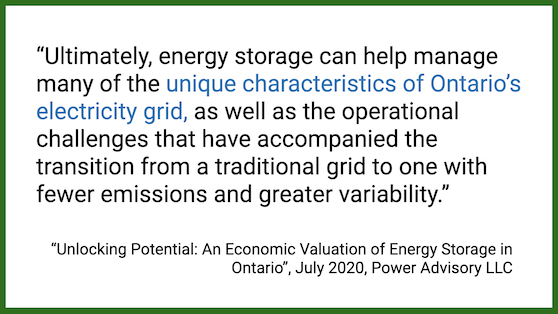
News
Energy & Power
Energy Storage
1000 MW of energy storage in Ontario could equal $2.7 billion in customer savings
September 18, 2020 | By Anthony Capkun

September 18, 2020 – According to a report commissioned by Energy Storage Canada, were Ontario to deploy a minimum of 1000 MW of energy storage resources, ratepayers would realize an estimated net savings of up to $774 million to over $2 billion over the next decade in the base case and high case scenarios, respectively.
Energy Storage Canada is a national industry association representing a range of companies engaged in the energy storage business, including technology providers, project developers, investors and operators, LDCs and NGOs.
Justin Rangooni, ESC’s executive director, says the report (“Unlocking Potential: An Economic Valuation of Energy Storage in Ontario”) aims to “present a full picture of the potential of energy storage in the province, and the benefits it would provide to ratepayers if energy storage were truly enabled”.
The report was prepared by Power Advisory LLC, an electricity market-focused management consulting firm. In the report’s Executive Summary, the writers insist:
“Ultimately, energy storage can help manage many of the unique characteristics of Ontario’s electricity grid, as well as the operational challenges that have accompanied the transition from a traditional grid to one with fewer emissions and greater variability. It can do that while lowering system costs by increasing the utilization of existing investments.”
Unfortunately, even though energy storage “can offer savings immediately”, a variety of barriers hinder its full realization in Ontario, say the authors.
“Given the current inability to fully integrate energy storage within Ontario’s electricity market, in order to unlock the system-wide value of energy storage now, the IESO will need to contract for energy storage for the full suite of services it can deliver, and enable the co-optimized operation of these storage resources to fully realize the savings potential for customers, which cannot be achieved on its own within the current market design and structure,” Rangooni says.
He points to other jurisdiction that have already established energy storage procurements and/or targets, including the New York State Energy R&D Authority, Nevada Energy and Australia’s Northern Territory.
“Energy Storage Canada therefore recommends for the IESO, in consultation with local distribution companies and the Ontario Energy Board, to immediately procure energy storage resources to begin to realize savings identified in the report, and to develop an enduring new market mechanism for energy storage in the medium and long term.”
Print this page